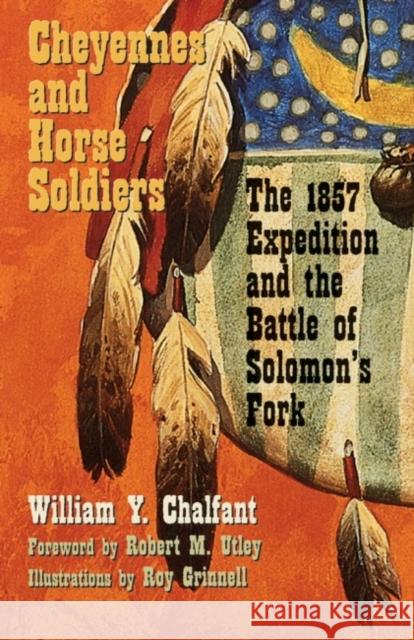Cheyennes and Horse Soldiers: The 1857 Expedition and the Battle of Solomon's Fork » książka
Cheyennes and Horse Soldiers: The 1857 Expedition and the Battle of Solomon's Fork
ISBN-13: 9780806135007 / Angielski / Miękka / 2002 / 440 str.
Cheyennes and Horse Soldiers: The 1857 Expedition and the Battle of Solomon's Fork
ISBN-13: 9780806135007 / Angielski / Miękka / 2002 / 440 str.
(netto: 78,44 VAT: 5%)
Najniższa cena z 30 dni: 82,03
ok. 30 dni roboczych
Bez gwarancji dostawy przed świętami
Darmowa dostawa!
The first major battle between the U.S. Army and the Cheyenne Indians took place on the south fork of the Solomon River in present-day northwest Kansas. In this stirring account, William Y. Chalfant recreates the human dimensions of what was probably the only large-unit sabre charge against the Plains tribes, in a battle that was as much a clash of cultures as of cavalry and Cheyenne warriors. In May 1857 the U. S. First Cavalry, under Col. E. V. Summer, had marched out of Fort Leavenworth to find and "severely punish" the Cheyennes for their attacks on immigrants and other travelers during the previous year-attacks precipitated largely by the army's earlier assaults on the Cheyennes. Two columns of soldiers moved westward, penetrating the territory of the southern bands of Cheyennes between the Santa Fe and Oregon-California trails, where few whites had been before. When the cavalry columns were reunited, early in July, the combined forces left their supply train behind and marched southeast across the plains. They were braving the extreme heat of summer with limited rations and little water when they finally met their quarry on the south fork of the Solomon. Resplendent in war finery, the Cheyennes had formed a grand line of battle such as was never again seen in the Plains Indian wars. William Chalfant recaptures the drama of the confrontation in his narrative: "As one the troopers reached down, and then 300 sabres arced above them, the bright afternoon sunshine flashing across the burnished steel as if the air were torn by a shower of flame. For an instant the blades were held aloft, then came down to the tierce point. At the same time the troopers gave out a mighty yell. And so they thundered across the valley of the Solomon, directly at the oncoming Cheyennes." In terms of history, the First Cavalry's campaign against the Cheyennes was a microcosm of relations between white civilization and Plains Indian. This exciting narrative penetrates the Indian and white cultures to show the battle marked the end of one era in Indian-white relations and the beginning of another.











